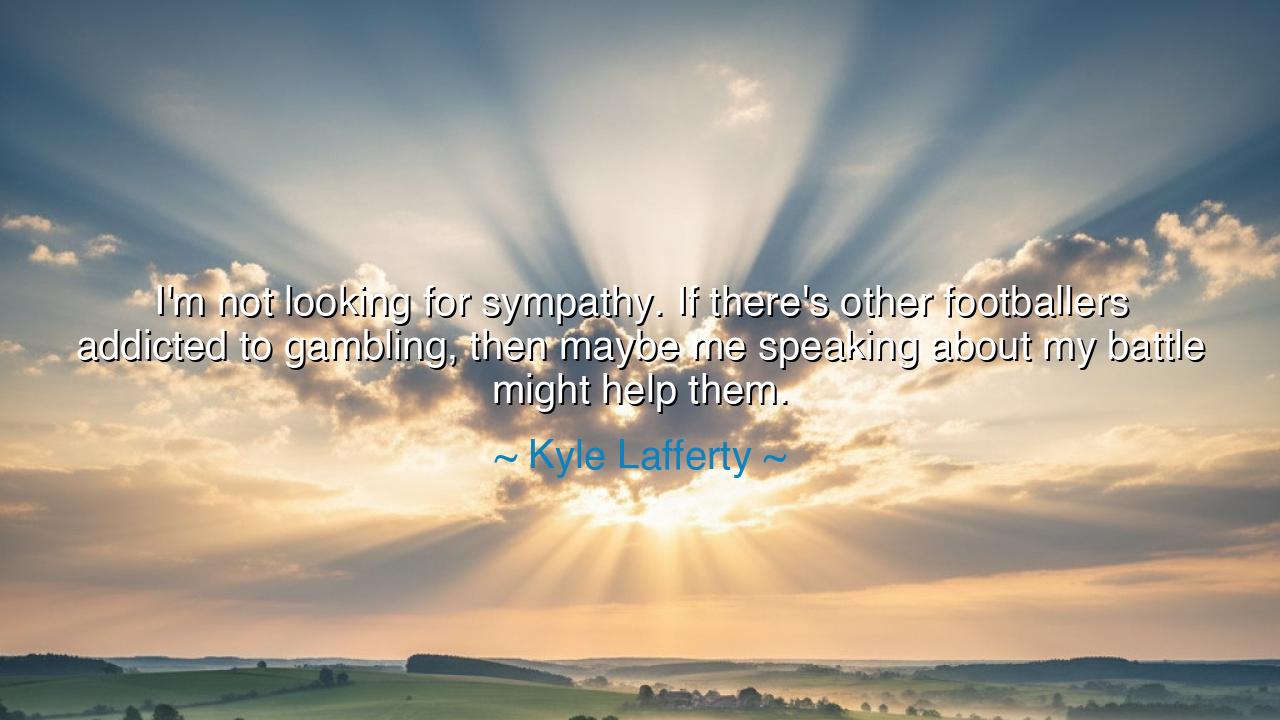
I'm not looking for sympathy. If there's other footballers
I'm not looking for sympathy. If there's other footballers addicted to gambling, then maybe me speaking about my battle might help them.






Hear, O seekers of truth, the voice of Kyle Lafferty, who once declared: “I’m not looking for sympathy. If there’s other footballers addicted to gambling, then maybe me speaking about my battle might help them.” In these words lies both humility and courage, for he seeks not pity, but purpose. His confession is not for his own relief, but for the aid of others. Thus he transforms private struggle into public teaching, his wound into a beacon, his fall into a ladder upon which others may climb.
The meaning is this: to reject sympathy is to reject the soft chains of pity that hold a man in the shadow of his pain. Lafferty does not cry out for tears or indulgence. Instead, he offers his suffering as testimony, that others caught in the snares of addiction might find a way forward. It is the ancient principle that from trial arises wisdom, and from hardship, strength. The man who overcomes his chains becomes not merely free, but also a guide to those still bound.
The ancients knew this pattern well. Consider the tale of Hercules, who, though tormented by madness and driven to terrible deeds, did not hide his shame. Instead, he took upon himself labors so great that his name resounds through ages. His struggles, though born of darkness, became the path of light for countless others, a story of perseverance against the impossible. So too does Lafferty’s honesty turn his burden into labor, his labor into teaching, his teaching into hope.
History offers us another example in the life of Abraham Lincoln, who bore the weight of melancholy. Rather than seeking endless sympathy, he transformed his pain into empathy for the struggles of a divided nation. He did not deny his sorrow but used it to better understand the wounds of others. Through this, he guided a people through war toward freedom. Lafferty’s act, though smaller in scope, springs from the same well: the choice to speak one’s truth, not for praise or pity, but to ease the path of others.
There is also wisdom in what he reveals about silence and courage. Many who suffer in secret believe they are alone, and in that solitude their burden grows unbearable. But when one voice rises—honest, vulnerable, unashamed—it can shatter the silence. It can remind others that they are not forsaken, that their battle is shared. Lafferty’s words, therefore, are not just confession but liberation, breaking the chains of secrecy that bind the afflicted.
The lesson for us is clear: transform your suffering into service. When life strikes you down, when you are scarred by addiction, grief, or failure, do not seek only sympathy. Seek instead to find the wisdom hidden in your wounds. Share it with those who still wander in the dark. For in so doing, your pain is not wasted; it becomes seed, and from it grows strength, understanding, and healing.
What practical steps can you take? Speak truthfully about your struggles to those who may need to hear them. Do not glorify your pain, but neither conceal it in shame. When you see another bound by the same chains you once bore, offer them guidance, not judgment. And in your own trials, look always for the lesson they carry, the wisdom they conceal, and the ways they might one day help another soul.
Thus, let Kyle Lafferty’s words echo in your heart: “I’m not looking for sympathy.” For sympathy alone is fleeting, but courage shared is eternal. And if even one man or woman is freed because another dared to speak, then the battle has not been in vain. This is the wisdom of the ages—that suffering, when transformed into service, becomes the highest gift a mortal can give.






AAdministratorAdministrator
Welcome, honored guests. Please leave a comment, we will respond soon